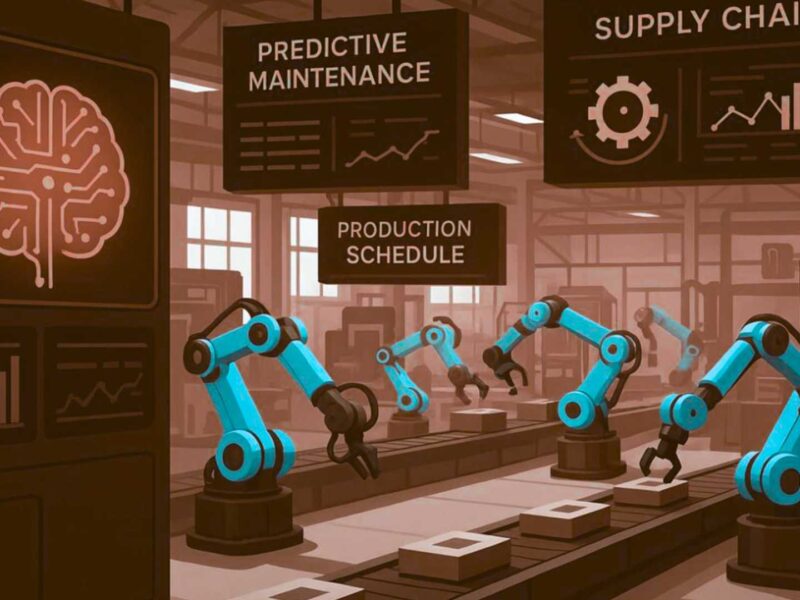The Roadmap to AI Impact: Driving Artificial Intelligence Toward Greater Good
Prepare to be inspired!
AI holds incredible potential to transform lives and tackle pressing societal challenges, from healthcare inequities to climate change and more.
But how can we ensure AI is harnessed for social good, delivering impact and fairness?
In this engaging article, The Techronicler team gathered powerful insights from business pioneers, community champions, and visionary thought leaders to address a vital question:
What’s one way to accelerate AI’s use for social good while meeting urgent societal needs?
Their responses brim with innovative strategies, impactful collaborations, and cutting-edge technologies to amplify AI’s role in shaping a brighter future.
From promoting inclusive data practices to forging cross-sector partnerships and leveraging open-source platforms, these leaders share practical ideas to drive meaningful change.
Join us as we explore how AI can become a force for good, addressing global issues while uplifting underserved communities.
Discover the perspectives shaping the future of AI for social impact and learn how we can collaborate to unlock its potential for a more equitable world!
Read on!
Dhari Alabdulhadi
Multi-sector partnerships that bring together nonprofits, governments, technology companies, and local communities represent one of the most effective means of accelerating AI for social good.
The convergence of technological, domain, and on-the-ground expertise enables these partnerships to co-create AI solutions that address real-world needs.
Initiatives such as the Google AI Impact Challenge have demonstrated that keeping the doors open, so to speak, through open calls and funding empowers many organisations. It may have had little to no experience with AI to tackle challenges in health, education, and disaster response.
Giving priority to equitable access, community engagement, and ethical consideration during AI design is essential for maximising impact and fostering solutions that are inclusive, transparent, and accountable.
The implementation of all these strategies can lead to scalable, responsible AI innovations capable of addressing society’s most pressing problems.

Dhari Alabdulhadi
CTO and Founder, Ubuy Peru
Xi He
An encouraging way of accelerating the use of AI for social good is the development of public-private data collaboratives—official partnerships whereby governments, nonprofits, and private technology companies share data, resources, and expertise to tackle pressing societal challenges (e.g., healthcare, climate, education, inequality).
Why It Matters: AI needs quality, diverse data to make smart predictions or decisions—but the best datasets are dispersed:
– Governments have demographic and environmental data.
– NGOs have grassroots, local expertise.
– Private sector has real-time behavioral or geospatial data.
Individually, each dataset is inadequate. Together, they make possible substantive models that can address actual problems.
Example Strategy: AI for Public Health
– Collaboration: A technology firm partners with a ministry of health and a global nonprofit.
– Data shared: Anonymized hospital visits, outbreaks of disease, and mobility data are combined.
– Impact: Predict the spread of diseases like dengue or COVID-19 and optimize medical supply distribution in real time.
This was partly achieved by BlueDot and other initiatives in the COVID-19 pandemic, proving the model’s efficacy.
Key Enablers:
– Ethical data-sharing agreements (GDPR-compliant, privacy-preserving)
– Open-source AI models tuned for public-sector use cases
– Local capacity building to allow communities to tailor and deploy AI responsibly
– Policy incentives (grants, tax credits) for private sector to support public efforts

Xi He
CEO, BoostVision
Leury Pichardo
I believe that getting younger kids to use tools like NotebookLM for their studies and picking up new skills. That’s a game changer in my view. It takes AI out of the clouds and puts it right into their hands as a genuinely useful daily helper.
Students could toss in their notes and get quick summaries, clear explanations of tricky stuff, or even ready-made study guides. This doesn’t just speed up learning; it pulls back the curtain on AI, showing it’s here to give our own brainpower a boost. When they actually see these tools helping them conquer tough subjects or learn something new, like coding or another language, they’ll get what AI is all about.
That kind of direct experience helps them see AI as a cool, powerful tool for making life easier and more productive, not something scary, and that opens doors for all sorts of cool ideas down the road.

Leury Pichardo
Manager, Digital Ceuticals
Mark Weinstein
AI is here to stay. And it has the potential to improve our lives in remarkable ways, from curing diseases to ending poverty to achieving scientific breakthroughs and much more. To ensure AI serves us, rather than the other way around, there are several key steps to take right now.
First, transparency is paramount. Either voluntarily or via legislative mandate, large AI and social media companies like Meta, Google and OpenAI must disclose what data they’re collecting from us and who they’re sharing it with.
Nutrition labels on food help us make healthy choices by telling us if something is high in sugar or cholesterol. Similarly, AI “nutrition labels” can tell us if an AI system is known to have a high amount of political bias or how well it protects our privacy. Crucially, companies can then provide everyone with the ability to opt out of manipulative personalization.
Second, new regulations are required to protect kids, teens and users of all ages from the threats posed by “AI companions.” Legislation like California’s Senate Bill 243 can help prevent AI chatbots from employing addictive engagement techniques and mandate protocols for handling signs of distress or suicide. This kind of targeted legislation deserves national adoption.
AI is a powerful sword that’s sharp on both sides. We can wield it responsibly and protect our kids as long as we retain our ability to think independently, reason cogently and communicate authentically.

Mark Weinstein
Tech Entrepreneur & Author, Restoring Our Sanity Online
Laura Templeton
One powerful way to accelerate the use of AI for social good is by bridging the gap between tech innovation and mission-driven leadership through intentional partnerships.
I believe that when visionary leaders, purpose-driven organizations, and AI developers come together with a shared goal—serving humanity—we unlock exponential potential.
It starts with asking better questions: Who is being left behind? How can AI bring more equity, not just efficiency?
By embedding empathy into AI design and implementation, we can create solutions that truly serve.
I’ve seen firsthand how AI, when guided by compassionate leadership and aligned with clear, human-centered values, can transform communication across varying industries.
Let’s lead with intention, collaborate across sectors, and use AI not just to solve problems—but to elevate people. That’s how we create a future where tech works for everyone.

Laura Templeton
Founder, 30 Second Success
David Newhoff
We at Mixbook are just beginning to understand how AI can deepen our relationship with the past.
Memory is messy, emotional, and deeply human. AI, when used with care and empathy, can help us sift through the noise to find the meaning within it. Sometimes it’s as simple as asking the right questions, encouraging people to explore the meaning behind moments and memories. In that meaning are the seeds to our most important stories.
We believe the future of memory preservation is storytelling. Not just archiving, but crafting, shaping, and sharing the stories that define our human experience. AI will help people go beyond the scroll, beyond the swipe, to rediscover the significance in the moments that might otherwise be lost.
Just as AI becomes more accessible across industries, we’re focused on ensuring it also becomes more emotionally intelligent. Not just smarter, but more supportive of creativity and connection. We see AI as a way to empower people creatively, to give them tools to express themselves and connect more deeply with others.
The role of AI in that future is to support, not replace, the heart of storytelling — our emotions, our relationships, and the bonds we build through shared memory.

David Newhoff
Chief Product Officer, Mixbook
Lakshman Rathnam
One powerful way to accelerate AI for social good is to focus on solutions that remove barriers to human connection, starting with language.
At Wordly AI Translation & Captions, we’re using AI to enable real-time, multilingual communication across business, government, education, and faith-based settings. This technology helps people participate fully in conversations that affect their lives, regardless of the language they speak.
To scale impact, we need partnerships between AI innovators, public institutions, and community organizations to ensure tools are built with empathy, accessibility, and trust at their core.
What excites me most is AI’s potential to foster inclusion and understanding on a global scale. When we use AI to empower connection, we move closer to a future where everyone feels heard, valued, and part of something bigger.
Kristiyan Yankov
I think the way to accelerate the use of AI for social good is by creating public-private partnerships that make high-quality data more accessible to startups and nonprofits solving real-world problems.
Most AI tools are only as good as the data behind them—and right now, much of that data is siloed inside big tech or government agencies. If we can open that up in responsible ways, we give smaller players the tools to innovate faster.
At Above Apex, I’ve seen how access to even limited but targeted data can drive smarter decision-making. Imagine what that could mean in healthcare, education, or climate if we gave the right people access to train models responsibly. The key is collaboration—tech leaders, local governments, and mission-driven teams need to stop working in silos and start building solutions together.

Kristiyan Yankov
Co-founder & Growth Marketer, Above Apex
Rose Hartwig
As a marketing executive, advisor, and board director for the non-profit Latinas in Tech, I believe one of the most powerful ways to accelerate AI for social good is by building partnerships across sectors.
We need to bring technologists together with public sector leaders, nonprofits, and underrepresented communities to co-create AI solutions that address the real-world challenges they’re seeing.
Many mission-driven organizations lack the resources to experiment with emerging tech, so expanding access to open-source tools, ethical AI frameworks, and multilingual data sets is critical.
Also important is inclusive governance, ensuring the people most impacted by AI have a seat at the table.
When AI is developed with, not just for, diverse communities, we create solutions that are more trusted, more relevant, and more likely to last.
Rose Hartwig
Managing Partner, Marketing Fluency
On behalf of the Techronicler community of readers, we thank these leaders and experts for taking the time to share valuable insights that stem from years of experience and in-depth expertise in their respective niches.
If you wish to showcase your experience and expertise, participate in industry-leading discussions, and add visibility and impact to your personal brand and business, get in touch with the Techronicler team to feature in our fast-growing publication.












